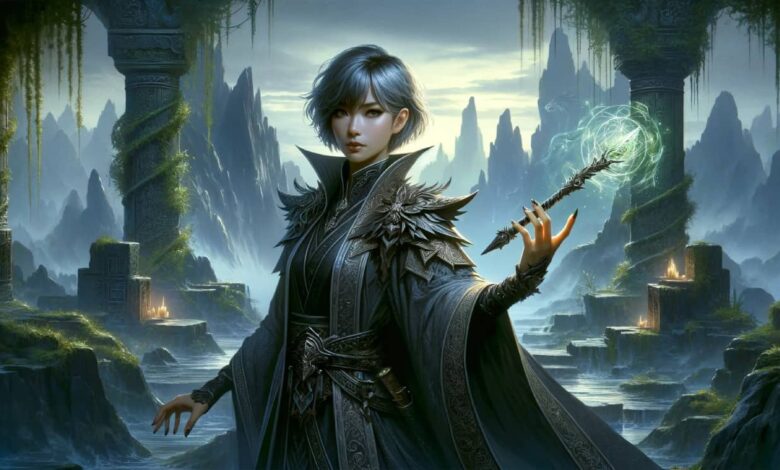Enchanting Warlock Names: A Guide to Crafting the Perfect Identity

Introduction to Warlock Names
The world of fantasy is rich with characters that enchant and intrigue, and few figures capture this allure like the warlock. Warlock names are not just arbitrary labels; they carry deep significance and embody the mystical qualities associated with these spellcasters. Unlike traditional names, warlock names often evoke a sense of darkness, mystery, and power, making them pivotal in establishing the character’s identity.
One important aspect of warlock names is their rich etymology, often rooted in ancient languages and cultures, which reflects the character’s magical heritage. Names can be derived from mythological figures, nature, or even arcane languages, creating a unique resonance that enhances the character’s lore. For instance, a name like “Thalathor” might suggest a connection to the shadows, while “Elowen” could hint at a bond with natural elements. The right warlock name instills an immediate sense of curiosity, urging observers to explore the character’s backstory and motivations.
The potency of a warlock’s name also lies in its ability to reflect the character’s alignment and purpose. A name can reveal whether they are a cunning trickster or a dark avenger. It provides insights into their moral compass, suggesting whether they engage in nefarious activities or strive for a noble cause, albeit through questionable means. Furthermore, in gaming and storytelling contexts, these names help players and audiences forge connections with the characters, enriching the experience through deeper emotional engagement.
Ultimately, the significance of warlock names transcends mere identification; they are an integral part of character creation that enhances immersion and invokes a sense of wonder. As we delve deeper into the enchanting realm of warlock names throughout this guide, it becomes clear that every name is a gateway into a world of magic and mystery, offering infinite possibilities for storytelling and character exploration.
The Importance of Naming in Fantasy
In the rich tapestry of fantasy literature and gaming, names hold profound significance, serving as gateways into a character’s identity and narrative. For warlocks, whose powers often derive from mystical forces, a carefully chosen name can encapsulate their background, abilities, and personality traits. A name functions not merely as a label but as an integral component of the character’s essence, often informing the audience about their heritage, strengths, and weaknesses.
When crafting warlock names, one must consider how these names relate to the characters’ magical prowess or their affiliations with particular realms. For instance, names that evoke darkness or cunning can suggest a background steeped in sinister practices, whereas names that hint at ancient wisdom may indicate a more scholarly approach to sorcery. This nuanced differentiation allows readers and players to form a deeper emotional connection with these characters, as they become more than mere figures within a story; they evolve into embodiments of their names and the legends they represent.
Cultural references also enrich this naming practice. Various warlocks from well-known media demonstrate how names can anchor characters within a larger mythos. For example, in classic literature and contemporary gaming, characters such as Gandalf and Jareth wield names that are steeped in narrative importance, enhancing their status and the weight of their actions. Such names resonate with fans, fostering connections that transcend the page or screen, into the realm of shared imagination. Thus, when developing warlock names, one must recognize their power; a name can evoke emotions, provoke thoughts, and ultimately leave a lasting impression on an audience captivated by the fantasy genre.
Elements of a Powerful Warlock Name
Crafting a warlock name is an art that requires attention to various linguistic elements that convey power and mystique. One of the most critical features is phonetics. Names that sound powerful often incorporate hard consonants and elongated vowels, which create a rhythm that feels as if it commands attention and respect. For instance, syllables such as “ar,” “zha,” or “thor” can resonate in a way that evokes imagery of arcane knowledge and strength. Likewise, softer sounds may be used sparingly to add an element of softness or allure, balancing the overall tone of the name.
Alliteration presents another compelling strategy in name creation. The use of repeated consonant sounds can make names not only easier to remember but also more enchanting. For example, names like “Malachai the Malevolent” or “Draegar Darkheart” have a certain allure due to their melodic rhythm, instilling a sense of grandeur and dark charm. This technique can enhance the memorability of a warlock’s identity in storytelling or gaming contexts, enriching the character’s lore with a sense of uniqueness.
The choice of specific syllables or sounds plays an instrumental role as well; certain phonemes carry cultural connotations that evoke magic or darkness. For instance, names drawing from ancient languages often resonate with historical depth and mysticism, lending credibility to the warlock persona. Additionally, cultural influences contribute significantly to the construction of a compelling warlock name. These influences can stem from mythology, folklore, or even pop culture elements, offering a plethora of choices that allow for personalized interpretation and identity while evoking the essence of dark magical practices.
In essence, the elements of phonetics, alliteration, and cultural resonance combine to shape a powerful warlock name, enhancing its significance and the character that bears it.
Types of Warlock Names: Dark, Mystical, and More
Warlock names often reflect the mystical and intricate nature of their identities. These names can vary significantly, embodying various themes and characteristics. The dominant categories of warlock names include dark, mystical, historical, and quirky styles, each offering unique connotations and inspirations for those developing their warlock personas.
Dark warlock names resonate with ominous power and foreboding allure. Emphasizing themes of shadow and danger, these names might include references to night, destruction, or malice. Examples include “Morwen Cindershadow” or “Draugr Bloodbane,” which evoke an atmosphere of mystery and menace. Such names often have roots in ancient languages or mythological references, enriching the warlock’s backstory.
Mystical names typically draw upon elements associated with magic and the ethereal. These names often contain references to the natural world, celestial bodies, or arcane symbols. Names like “Elysia Starweaver” or “Zephyr Moonwhisper” suggest a deep connection with the mystical realms, capturing the magic attributed to warlocks in popular culture.
Historical warlock names can reflect various eras and cultures, offering a sense of authenticity and depth. Utilizing names inspired by legends, tales, or historical figures can add richness to a character. For instance, “Alaric the Cunning” or “Isolde Nightshade” provides an element of drama, linking the warlock’s identity to the grand tapestry of history.
Finally, quirky names can add an unexpected twist to the traditional concept of warlocks. These names may playfully combine elements from multiple types, creating memorable and unique identities. “Fizzlebang Twiddlepot” or “Wibble Wobblebark” showcases this fun approach, offering a lighter take on whatwarlock names can embody.
In conclusion, the diversity of warlock names provides endless opportunities for creativity and personalization. Whether drawing from dark, mystical, historical, or quirky influences, each choice contributes to the enchanting identity of the warlock character.
Creating Your Own Warlock Names
Crafting a unique warlock name can be a rewarding and imaginative process, allowing you to express your character’s identity, abilities, and personality. This section will guide you through the steps to create your own warlock names, making use of various techniques to inspire your creativity.
Begin by brainstorming ideas that resonate with your envisioned warlock. Consider the characteristics you wish to portray, such as power, wisdom, or mystery. Jot down words, phrases, or concepts that capture these qualities. For instance, think about elements from nature like “shadow,” “storm,” or “fire,” and the impact they have on your warlock’s character. Incorporating these themes can provide a solid foundation for your name.
Another effective technique is using name generators available online. These tools can offer inspiration and instant results based on selected criteria. While utilizing generators, consider modifying the results slightly to suit your preferences, making the name that is generated feel more personal and unique. You can also play around with syllables or sounds to create names that are both melodic and evocative.
Combining words or roots from various languages can add depth to your warlock names. Latin, Old English, and even fictional languages can inspire names that have a powerful or arcane feel. For example, blending Latin terms for mystical elements—such as “tenebrae” meaning shadows—can create a sense of enigma. Experimenting with combinations may lead to unexpected and captivating results.
Ultimately, the goal is to have fun while crafting a name that reflects the essence of your warlock persona. Once you have developed a list of potential warlock names, test them out in different contexts, such as in gameplay or storytelling, to see which one resonates most strongly. This will empower you to create a meaningful identity that enhances your overall experience.
Famous Warlocks and Their Names Explained
Throughout literature, film, and gaming, warlocks have played pivotal roles, and their names often carry deep significance, reflecting their powers, personalities, or destinies. One of the most recognized warlocks is actually the “Dark Lord” himself, Voldemort, from J.K. Rowling’s Harry Potter series. His name, which means “flight from death,” signifies his quest for immortality and mastery over dark magic, encapsulating his character’s ambition and moral decay. The transformation from Tom Riddle to Voldemort serves as a critical narrative device, indicating his complete embrace of dark powers and the persona he has crafted.
Another notable warlock is Elminster Aumar, a significant character from the Dungeons & Dragons universe. Known as the Sage of Shadowdale, Elminster’s name evokes a sense of ancient wisdom and strength, aligning perfectly with his extensive magical abilities. His long and storied background reflects the archetypical journey of the wise mentor, whose name reinforces his role as a guide within the complex narrative of the Forgotten Realms. This illustrates how a character’s name can enhance their presence in a story, establishing expectations about their capabilities and personality.
In the realm of television, we find characters like the warlock Crowley from the series Supernatural. His name, reminiscent of the famous occultist Aleister Crowley, adds layers to his character as a manipulative and cunning figure. Crowley’s identity as a demon with warlock-like qualities demonstrates the intersection of traditional names with modern narratives, creating a rich tapestry that invites analysis on the nuances of naming conventions. Each name chosen for these characters not only serves as an identifier but also enriches the story, illustrating the profound impact of well-crafted warlock names on character development and plot dynamics.
Cultural Influences on Warlock Names
The intricate tapestry of warlock names is significantly woven from the threads of various cultures, mythologies, and historical figures. These names often reflect not only the personal identity of the warlock but also encapsulate elements of cultural heritage and historical context. Many warlock names draw inspiration from folklore and mythological beings, aligning themselves with the mystique and power associated with these legends. For instance, the names derived from ancient frameworks, such as Norse or Celtic mythology, often evoke a sense of legend and power, embedding a deeper meaning into the identity of the character.
In several cultures, warlocks are depicted as figures possessing both wisdom and a strong connection to nature, often gaining their powers through rigorous training and deep respect for the mystical elements of their surroundings. Names like “Morgath” or “Fintan” may resonate with individuals who appreciate the enigmatic heritage of the Celtic tradition, whereas names inspired by Norse legends, such as “Loki” or “Thorgrim,” evoke the strength and complexity found in such storied tales. These names often serve as a bridge between the character’s identity and the cultural narratives that inform their actions and motives.
Furthermore, historical figures and literary characters contribute to the rich pool of warlock names. The works of writers such as J.K. Rowling and H.P. Lovecraft have introduced a variety of names that range from the heroic to the sinister. Each name captures an essence, hinting at the character’s background and their connection to the supernatural. Names derived from real-world historical figures enable enthusiasts to pay homage to the legacy of sorcery, wizardry, and the arcane, revealing the powerful cultural influences that shape them. Ultimately, the creation of warlock names is a reflection of a diverse set of beliefs, personalities, and traditions that continue to inspire and enchant. In conclusion, the interplay of culture and mythology enriches the world of warlock names, enabling individual identifiers to become powerful representations of identity and history.
Common Mistakes to Avoid When Choosing Warlock Names
When it comes to crafting the perfect identity for a warlock, selecting the right name can make all the difference. However, many aspiring writers and creators fall into several common pitfalls that can hinder the effectiveness of their chosen warlock names. One of the most significant mistakes is opting for clichéd names that lack originality. Names such as “Darkshadow” or “Eldritch” may evoke the idea of a powerful warlock, but they can also come off as unimaginative, failing to leave a lasting impression. To create an engaging warlock persona, consider employing unique components, such as blending lesser-known mythological references or utilizing foreign languages to derive inspiration.
Another frequent misstep is choosing names that are overly complex or difficult to pronounce. A name should evoke a sense of mystery and intrigue, but it should remain accessible to readers. If a warlock’s name is challenging to articulate, it may detract from their character’s overall presence. Instead, strive for a balance between uniqueness and simplicity, ensuring that the name resonates with your intended audience.
Moreover, failing to consider a character’s backstory can lead to names that feel out of place. Warlock names should reflect the character’s origin, personality, and magical prowess. Understanding the character’s motivations and past experiences can aid in producing a name that captures their essence effectively. For instance, a former noble who turned to dark magic may have a name that echoes their heritage while incorporating elements of their newfound identity as a warlock.
In summary, avoiding the traps of clichéd, difficult-to-pronounce names, and names that do not align with character backgrounds will greatly enhance the quality of your warlock names. By creating unique and meaningful identities, you can enrich your storytelling and engage your audience more profoundly.
Conclusion: The Magic of a Well-Chosen Name
Throughout this exploration of warlock names, we have delved into the profound significance that a name holds within the world of fantasy. A name is not merely a collection of letters; it embodies the essence of a character’s identity, encapsulating their powers, backstory, and personality traits. For warlocks, whose personas often traverse the realms of the arcane and the mysterious, the right name can profoundly influence how they are perceived within their narrative universe.
We initiated our discussion by highlighting various sources of inspiration, ranging from mythological references and literary allusions to personal experiences and linguistic creativity. These varied approaches enable aspiring writers and game developers to craft warlock names that resonate deeply with the audience, evoking a sense of enchantment and intrigue. The importance of sound and rhythm in a name’s composition cannot be overstated; a captivating name can communicate strength or vulnerability, adding layers to a character’s persona.
Furthermore, character development is intrinsically linked to naming. A carefully chosen name has the potential to enhance the storytelling experience, enriching interactions among players or readers. Names can also reflect a warlock’s affiliations, such as their patrons or realms of power, further enriching the narrative tapestry. Therefore, when creating or selecting warlock names, it is essential to consider their implications and potential to shape the character’s journey.
In conclusion, investing the time to choose or create meaningful names allows for a fuller engagement with storytelling and gameplay, ensuring that warlocks are not just figures on a page or screen but complex identities enriched by the magic of their names. Whether you are a writer, gamer, or an avid storyteller, the enchantment of a well-chosen name is an essential element that brings depth and allure to your characters.
You May Also Read This Usaworldtoday



